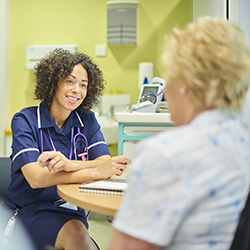The Royal College of General Practitioners have highlighted what to expect for primary care consultations post lockdown.
RCGP stated before lockdown measures were introduced approximately 70% of appointments were face to face and now expects 50% of appointments to be face to face and 50% remote consultations in place moving forward.
Professor Martin Marshall, Chair of the Royal College of GPs, said: “Following the introduction of lockdown, and in line with Government advice, general practice has swiftly and drastically changed the way it works with the majority of GPs continuing to care for our patients remotely. This has been to help stop the spread of COVID-19 in the community and keep GPs, our teams and our patients as safe as possible.
“Before lockdown was introduced, Royal College of GPs’ data shows that, approximately a quarter of GP appointments were carried out remotely and around 70% carried out face-to-face. However, since the introduction of lockdown these figures have reversed with approximately 70% of GP appointments being carried out via video or telephone.
“Although GPs and our teams have mostly interacted with patients remotely throughout the pandemic, we’re acutely aware that face-to-face appointments are sometimes necessary – for example, when a patient or doctor thinks it adds value, or when a physical examination is needed or a child needs to be vaccinated – and arrangements will always be made to facilitate this.
“Many patients have been receptive to the changes in how general practice services have been delivered during the pandemic, and both patients and GPs understand the extraordinary reasons for these changes. We also know some people find remote consultations more convenient than going to a surgery, but remote consultations don’t work for everyone – some patients, particularly those with complex needs, tell us that they prefer seeing their doctor in person
“As we move out of lockdown, we need to be able to offer a range of access options for patients to suit their needs and preferences. It is in no one’s interest for general practice to become a largely remote service as that will run the risk of isolating some patients, for example those with complex needs as well as our less tech-savvy patients and those who don’t have access to the appropriate tech – this in turn risks exacerbating health inequalities.
“The way in which GPs switched to a largely remote service has been remarkable, and it has played an important part in helping to slow the spread of COVID-19. But moving forward, we envisage more of a balance in the way people access general practice services, perhaps with 50% face-to-face and 50% remote appointments. This seems realistic and sensible.”



